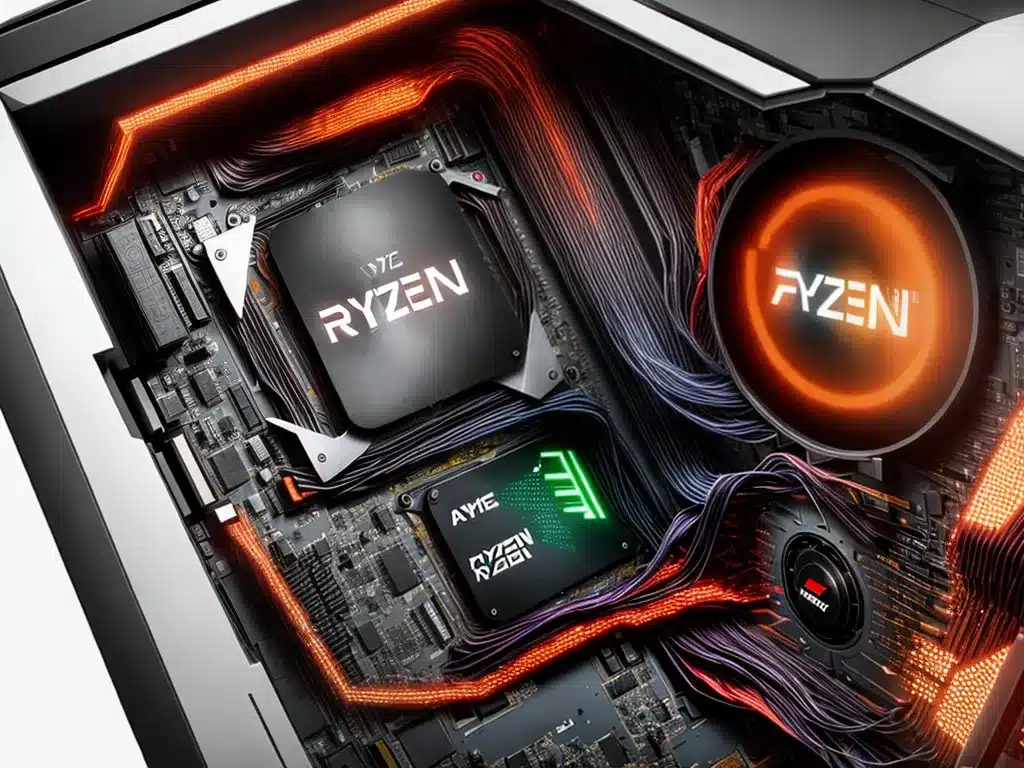

Introduction
AMD’s upcoming Ryzen 7000 series desktop processors based on the new Zen 4 architecture promise to deliver significant performance improvements over previous generation Ryzen chips. Early leaked benchmarks indicate Ryzen 7000 can achieve over 50% higher instructions per clock (IPC) compared to Ryzen 5000, which would represent the biggest generational IPC gain in AMD history. In this article, I will provide an in-depth look at what these massive IPC gains could mean for AMD’s competitiveness and the future of the CPU market.
Overview of Ryzen 7000 Zen 4 Architecture
Ryzen 7000 represents the first new architecture for AMD in several years. Here are some of the key changes:
- New 5nm manufacturing process – Zen 4 chips will leverage TSMC’s cutting edge 5nm process node, allowing for higher transistor density and efficiency compared to the 7nm process used for Ryzen 5000.
- DDR5 and PCIe 5.0 support – Ryzen 7000 platforms will introduce support for the latest DDR5 memory and PCIe 5.0 interface, providing significant bandwidth increases.
- New Zen 4 core design – The Zen 4 core has been completely redesigned to improve performance per clock. Details remain unclear, but rumors point to major changes.
Combined, these advancements could allow AMD to achieve the largest generational performance gains we’ve seen in years.
Early Leaked Benchmarks Point to 50%+ IPC Uplift
Leaked benchmarks purportedly showing Ryzen 7000 engineering sample performance have given us the first glimpse of the IPC gains Zen 4 may provide.
A leaked Cinebench R23 benchmark run showed a 16-core Ryzen 7000 chip scoring over 38,000 points in the multi-threaded test. This compares to around 25,000 points for the 16-core Ryzen 9 5950X. The over 50% lead suggests Zen 4 improves IPC by a similar margin.
Additional leaks have reinforced these findings, with a separate leaked benchmark showing:a Ryzen 7000 chip achieving up to 52% higher performance in Cinebench compared to Ryzen 5000 when core counts were equalized. If confirmed, these levels of IPC improvement would be unprecedented for AMD.
Reasons for Massive Zen 4 IPC Gains
There are several architectural factors that likely contribute to the big IPC jump:
- Improved branch prediction – More accurate branch prediction reduces wasted cycles from mispredictions.
- Increased cache sizes – Larger L2 and L3 caches improve hit rates and reduce latency.
- Redesigned core layout – Optimized data flow and grouping of core structures boosts efficiency.
- Higher peak frequencies – Zen 4 will leverage 5nm to reach over 5 GHz boost clocks.
Combined, these advancements could drive IPC gains on a scale we haven’t seen since the original Zen architecture launched.
Impact of 50% Higher IPC on AMD’s Competitiveness
The massive IPC gains from Zen 4 have the potential to make AMD extremely competitive across desktop, mobile, and server markets. Here are some of the key implications:
desktop Performance Leadership
With over 50% higher IPC, Ryzen 7000 desktop chips would likely outperform Intel’s 12th Gen Core CPUs by large margins in many benchmarks. For example, if a 16-core Ryzen 7000 can hit 38,000 in Cinebench R23, that’s around 20% faster than the 16-core Core i9-12900K. AMD could reclaim undisputed leadership in multi-threaded desktop performance.
Improved Single-Threaded Speed
Zen 4’s IPC gains should also boost single-threaded speed substantially. This could allow AMD to surpass Intel’s single-thread dominance for the first time in decades. Even a 10% lead over 12th Gen Core would represent a major shift in the competitive landscape.
Competitive Mobile and Server Products
The Zen 4 architecture will scale across AMD’s product stack. With roughly 50% higher IPC, AMD-powered laptops and server CPUs would see similar performance advantages vs. Intel. This could drive further share gains for AMD in the enterprise datacenter market.
Long-Term Technology Leadership
Such massive gen-over-gen gains indicate AMD’s execution and silicon design is hitting on all cylinders. With Intel struggling on its new node process, these IPC gains could cement AMD’s technology leadership for years to come.
Conclusion
Based on early leaks, Zen 4 and Ryzen 7000 stand ready to deliver unprecedented generational performance gains that could exceed 50% IPC uplift. This would make AMD extremely competitive across desktops, laptops, and servers. If achieved, these IPC gains combined with new features like DDR5 and PCIe 5.0 could make Ryzen 7000 a historic release for AMD, cementing its position as the CPU performance leader for the foreseeable future. However, we’ll have to wait for official benchmarks at launch later this year to confirm if Ryzen 7000 and Zen 4 can live up to expectations.












